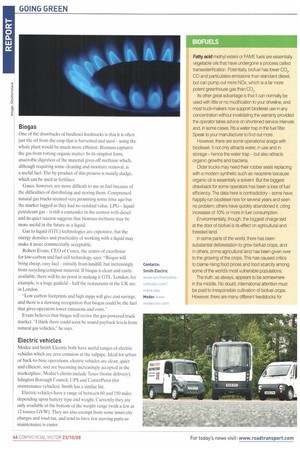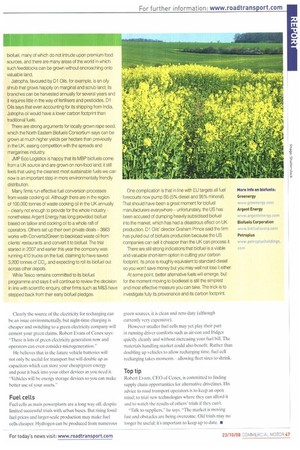BIOFUELS
Page 46

Page 47

If you've noticed an error in this article please click here to report it so we can fix it.
Fatty acid methyl esters or FAME fuels are essentially vegetable oils that have undergone a process called transesterification. Potentially, biofuel has lower CO2, CO and particulates emissions than standard diesel, but can pump out more NOx, which is a far more potent greenhouse gas than CO2.
Its other great advantage is that it can normally be used with little or no modification to your driveline, and most truck-makers now support biodiesel use in any concentration without invalidating the warranty provided the operator takes advice on shortened service intervals and, in some cases, Ms a water trap in the fuel filter. Speak to your manufacturer to find out more.
However, there are some operational snags with biodiesel. It not only attracts water, in use and in storage hence the water trap but also attracts organic growths and bacteria.
Older trucks may need their rubber seals replacing with a modern synthetic such as neoprene because organic oil is essentially a solvent. But the biggest drawback for some operators has been a loss of fuel efficiency. The data here Is contradictory some have happily run biodiesel now for several years and seen no problem; others have quickly abandoned it, citing increases of 10% or more in fuel consumptIon.
Environmentally, though, the biggest charge laid at the door of biofuel is its effect on agricultural and forested land.
In some parts of the world, there has been substantial deforestation to grow biofuel crops, and in others, prime agricultural land has been given over to the growing of the crops. This has caused critics to blame rising food prices and food scarcity among some of the world's most vulnerable populations.
The truth, as always, appears to be somewhere in the middle. No doubt, international attention must be paid to irresponsible cultivation of biofuel crops. However, there are many different feedstocks for biofuel, many of which do not intrude upon premium food sources, and there are many areas of the world in which such feedstocks can be grown without encroaching onto valuable land.
Jatropha, favoured by D1 Oils, for example, is an oily shrub that grows happily on marginal and scrub land; its branches can be harvested annually for several years and it requires little in the way of fertilisers and pesticides. D1 Oils says that even accounting for its shipping from India, Jatropha oil would have a lower carbon footprint than traditional fuels.
There are strong arguments for locally grown rape seed, which the North Eastern Biofuels Consortium says can be grown at much higher yields per hectare than previously in the UK, easing competition with the spreads and margarines industry JMP Eco Logistics is happy that its MBP biofuels come from a UK source and are grown on non-food land; it still feels that using the cleanest most sustainable fuels we can now is an important step in more environmentally friendly distribution.
Many firms run effective fuel conversion processes from waste cooking oil. Although there are in the region of 100,000 tonnes of waste cooking oil in the UK annually clearly not enough to provide for the whole industry nonetheless Argent Energy has long provided biofuel based on tallow and cooking oil to a whole raft of operators. Others set up their own private deals 3663 works with Converts2Green to backioad waste oil from clients' restaurants and convert it to biofuel. The trial started in 2007 and earlier this year the company was running 410 trucks on the fuel, claiming to have saved 3,200 tonnes of 002, and expecting to roll its biofuel out across other depots.
While Tesco remains committed to its biofuel programme and says it will continue to review the decision in line with scientific enquiry, other firms such as M&S have stepped back from their early biofuel pledges.
One complication is that in line with EU targets all fuel forecourts now pump B5 (5% diesel and 95% mineral). That should have been a great moment for biofuel manufacturers everywhere unfortunately, the US has been accused of dumping heavily subsidised biofuel into the market, which has had a disastrous effect on UK production. DI Oils' director Graham Prince said the firm has pulled out of biofuels production because the US companies can sell it cheaper than the UK can process it.
There are still strong indications that biofuel is a viable and valuable short-term option in cutting your carbon footprint. Its price is roughly equivalent to standard diesel so you won't save money but you may well not lose it either.
At some point, better alternative fuels will emerge, but for the moment moving to biodiesel is still the simplest and most effective measure you can take. The trick is to investigate fully it provenance and its carbon footprint.








































































































































































